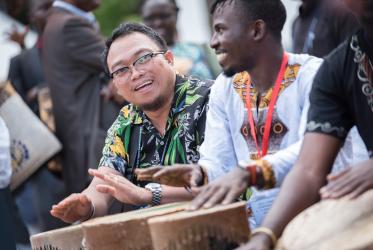For public theology, “the essential and pressing task of the churches and theological education is to foster love, dialogue, forgiveness, reconciliation” says Prof. Dr Rudolf Von Sinner.
He is moderator of the World Council of Churches’ (WCC) commission on Ecumenical Theological Education (ETE) and he delivered a keynote presentation at a consultation in São Leopoldo, Brazil, between 19 and 23 November.
It was the first part of a twin consultation on Reformation, Education and Transformation. The second gathering is planned for May 2016 in Halle, Germany.
Von Sinner is Professor of Systematic Theology, Ecumenism and Inter-Religious Dialogue and Dean of Postgraduate Studies and Research at Faculdades EST in São Leopoldo.
He reflected on religious fundamentalism and the challenges for Christian education in the world today.
Entitled, “Churches in the public space: towards a public theology focused on citizenship,” the presentation stressed the role of religion in the current global context.
It “can be constructive as long as it is open to communicate with other expressions of knowledge of the world,” said von Sinner.
The event at Faculdades EST was the first part of a twin consultation and received contributions from international, intercultural and ecumenical perspectives on issues concerning “Reformation and One World”.
Partners will add insights from the consultation to the 500th anniversary celebrations of the Reformation in 2017.
The concept of “twin” encompasses the close relation of content at the two consultations. People and ideas from the global South and global learning are integrated into an ongoing dialogue.
Besides keynote presentations, participants took part in several thematic workshops, made exposure visits to projects developed by churches in the region. They attended worships in local congregation and discussed what it means for Reformation churches today to express a social witness.
Prof. Dr Esther Mombo, from the St. Paul University, Kenya was another keynote speaker.
She showed how the themes of Reformation, Education, and Transformation are “an ongoing process not trapped in the historical milieu in which they happened.” Mombo explained they are “connected as reformation continues to be a stronghold of education and education a stronghold for transformation”.
She focused on the legacy of reformed theological institutions approaching gender issues from the perspective of theology.
“Engendering theological education recognizes that theory does not always reflect any form of praxis and that constructive criticism and reflective interrogation are essential in theological inquiry and learning,” said the Kenyan theologian.
Mombo affirmed that “engendered theological education stresses conceptuality, dialogue, openness, grace and willingness to learn and to discern God’s will and truth in every context.” She said, “It has challenged other institutions to open up departments of theology together with those of religious studies especially for higher education.”
Dr Ioan Sauca, associate general secretary of the WCC and director of the Ecumenical Institute at Bossey, Switzerland, noted the consultation is an important tool of the WCC’s ETE programme.
“Theological education helps churches to prepare better community leaders, theologians and theological educators to become interpreters of the gospel in the world, and to build viable bridges of understanding between churches of different traditions and the fractured societies of contemporary times,” he said.
The second part of the twin consultation will take place in Halle, Germany, in May 2016.
The initiative is promoted by Evangelisches Missionswerk (EMW), Brot für die Welt, Faculdades EST, Franckesche Stiftungen zu Halle and Martin Luther Universität Halle-Wittenberg, in cooperation with the WCC, the Lutheran World Federation (LWF), the World Communion of Reformed Churches (WCRC) and the Evangelical Church in Germany (EKD).
Learn more about the twin consultation at www.r-e-t.net







